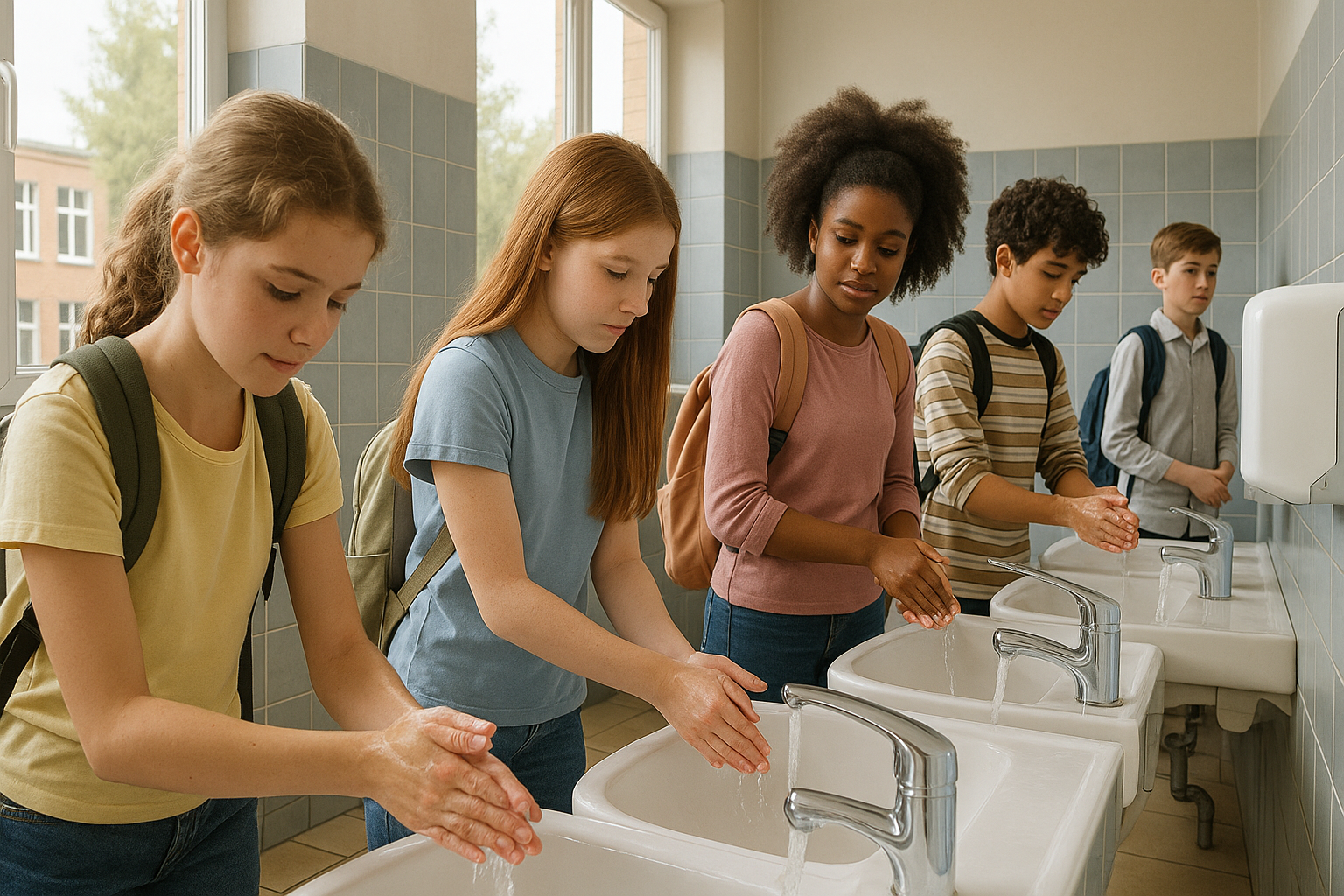Building Dignity: How European Schools Advance Hand Hygiene and Menstrual Health
The WHO and UNECE report highlights how schools across Europe and Central Asia are improving hand hygiene and menstrual health through inclusive infrastructure, education, and policy reforms. It showcases innovative national efforts that promote dignity, gender equality, and healthier learning environments for all students.

A study developed jointly by the World Health Organization (WHO) Regional Office for Europe, the United Nations Economic Commission for Europe (UNECE), the International Water Assessment Centre (IWAC), and the German Environment Agency (UBA) examines how schools across Europe and Central Asia are advancing hygiene and menstrual health. Drawing from over 30 countries, it showcases policies, innovations, and real-world practices that strengthen student well-being and promote gender equality. The publication emphasizes that simple acts, such as handwashing and safe menstrual management, are fundamental to learning and dignity, yet they remain neglected in many schools across the region.
Hygiene Becomes a Public Health Imperative
The report opens by framing hygiene as a basic human right and a cornerstone of public health. Across the Pan-European region, countless schools still lack access to soap, clean water, and private toilets. These shortcomings became glaringly visible during the COVID-19 pandemic, which, as the report describes, acted as both a crisis and a catalyst. The health emergency underscored that hand hygiene is not merely about cleanliness but a powerful tool against disease transmission. It also reignited attention to menstrual health, exposing deep-seated inequities faced by girls who often miss school or endure shame because of poor facilities or stigma.
Transforming Classrooms Through Hygiene Education
Case studies from the report illustrate how governments are integrating hygiene into everyday school life. In Azerbaijan, the national "WASH in Schools" programme sets clear standards for infrastructure and inspection. Portugal takes a creative approach, schools host playful campaigns and art projects that encourage students to wash their hands regularly. The report emphasizes that success comes when hardware and behavior go hand in hand. Training teachers, incorporating hygiene lessons into the curriculum, and promoting peer learning have led to measurable improvements. Schools with consistent hygiene education report fewer absences linked to infections and stronger student engagement in health-promoting behaviors.
Breaking Taboos Around Menstrual Health
Menstrual health management receives unprecedented attention in the report, marking a cultural shift in how schools address gender and dignity. It argues that menstruation should be viewed not as a private matter but as a public health and equality issue. In Scotland, pioneering legislation guarantees free menstrual products in all public institutions, setting a global benchmark. Kazakhstan has introduced classroom discussions on menstruation led jointly by teachers and health workers, helping to replace embarrassment with understanding. Meanwhile, France and Germany are partnering with NGOs to distribute products and promote inclusive menstrual education for both boys and girls. These examples, the report notes, are transforming schools into spaces of empowerment rather than exclusion.
Building Inclusive and Sustainable Infrastructure
The publication goes beyond policy, showing how physical environments shape dignity. Schools must have safe, private, and accessible washrooms for all, including students with disabilities. Visuals in the report highlight modernized facilities with wider stalls, menstrual waste bins, and gender-neutral layouts. Yet, infrastructure alone is not enough; it must be paired with cultural awareness. In multicultural communities, schools adapt hygiene messages to local customs without compromising global standards. The authors also highlight the importance of data collection and monitoring, pointing out that many countries still lack national systems to track hygiene and menstrual health in schools. Without such data, inequalities remain invisible.
Towards a Healthier and Fairer Future
The WHO and UNECE urge countries to treat hygiene and menstrual health as core components of education policy, not side issues. The most successful examples come from nations like Kyrgyzstan, where the "Healthy School" programme links hygiene indicators to school performance, and Lithuania, where student-led "WASH clubs" foster accountability and pride among pupils. The report acknowledges ongoing barriers, limited budgets, rural infrastructure gaps, and persistent gender stereotypes, but insists they can be overcome through political will and cross-sector cooperation.
The report ties these efforts to the broader Sustainable Development Goals (SDGs), notably SDG 3 on Health, SDG 4 on Quality Education, SDG 5 on Gender Equality, and SDG 6 on Clean Water and Sanitation. It envisions schools as safe, inclusive spaces where every child can access clean water, soap, and menstrual dignity. Ultimately, the report presents a region in transformation: moving from neglect to empowerment, from silence to openness, and from infrastructure gaps to inclusive action. When children can wash their hands safely and manage menstruation with dignity, they don't just stay healthy, they thrive as equal, confident learners shaping a fairer future for all.
- FIRST PUBLISHED IN:
- Devdiscourse
ALSO READ
-
Look at RJD-Congress posters, one who was Bihar CM for years, his photo has been relegated to corner: PM in apparent reference to Lalu.
-
WHO Calls for Unified Global Effort on World One Health Day
-
Those who once made fun of 'Beti Bachao Beti Padhao' are now thinking about how they insulted India's daughters: PM Modi in Saharsa.
-
It's PM, central leaders who are running Bihar govt, not Nitish, alleges Cong leader Priyanka Gandhi Vadra at rally in Saharsa.
-
Youth Leaders Declare Social Isolation a Global Health Crisis at WHO Event









